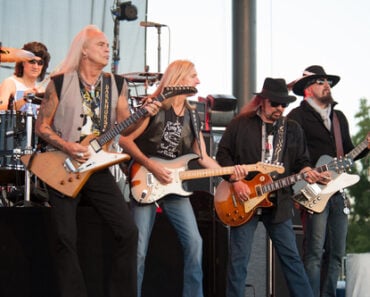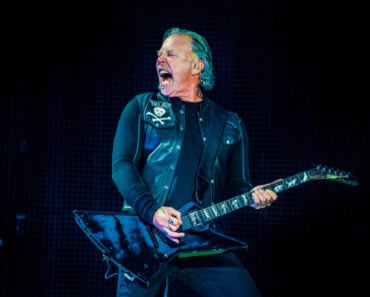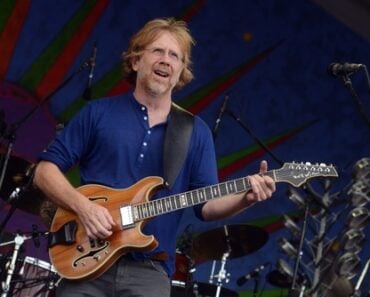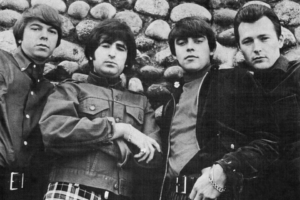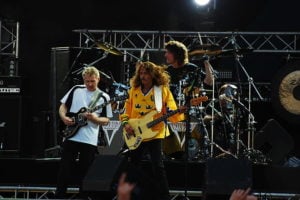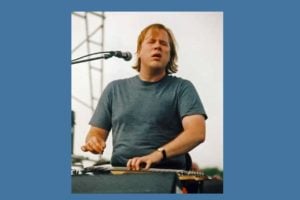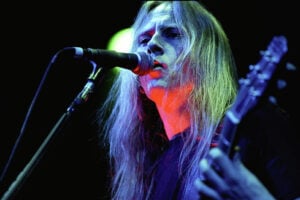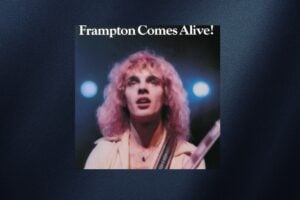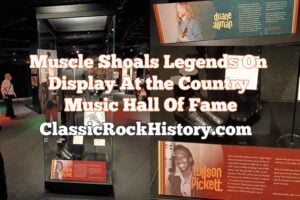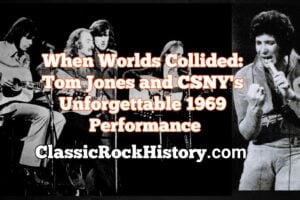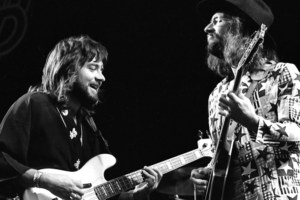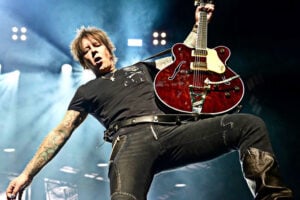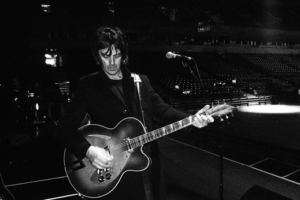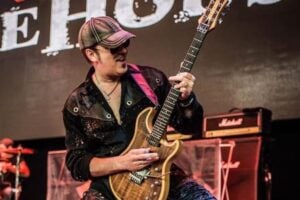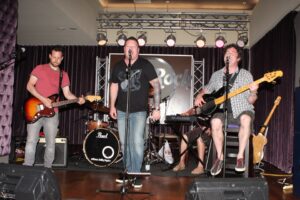
Feature Photo: Eva Rinaldi, CC BY-SA 2.0 <https://creativecommons.org/licenses/by-sa/2.0>, via Wikimedia Commons
Smash Mouth’s roller-coaster journey through pop culture began in 1990s San Jose, where an unlikely fusion of punk energy, ska rhythms, and retro pop sensibilities created one of the most instantly recognizable sounds in millennial music. Founded in 1994 by former rapper Steve Harwell and his manager Kevin Coleman, who recruited guitarist Greg Camp and bassist Paul De Lisle, the band rocketed from local club favorite to international phenomenon with their breakthrough hit “Walkin’ on the Sun” before achieving immortality when their infectiously optimistic anthem “All Star” became forever intertwined with a certain green ogre named Shrek.
Despite platinum-selling success that saw them conquer radio waves, movie soundtracks, and early internet culture, Smash Mouth weathered the tumultuous storms of lineup changes, shifting musical trends, and health struggles that eventually claimed founding vocalist Harwell, who passed away in 2023 at age 56 following his retirement from the band two years earlier. Through decades of triumphs and tribulations, their catchy melodies and distinctive sound proved remarkably resilient, with singles like “All Star” enjoying multiple cultural revivals through memes, movie placements, and nostalgia cycles that introduced the band to entirely new generations of listeners.
Now continuing with vocalist Zach Goode fronting the band since 2021 and original bassist Paul De Lisle remaining as the sole founding member, Smash Mouth persists as both a living, touring entity and a cultural artifact—a band whose biggest hits have transcended their original context to become embedded in the collective consciousness of multiple generations, ensuring that whether through ironic appreciation, genuine nostalgia, or rediscovery by new listeners, somebody once told me… will forever trigger an automatic melodic response in millions of minds around the world.
Steve Harwell
Steve Harwell, born January 9, 1967, in Santa Clara, California, emerged from the Northern California rap scene to become the charismatic frontman who defined Smash Mouth’s public image for over two decades. Before forming the band, Harwell had performed as a rapper in a group called Freedom of Speech (F.O.S.), embracing the Public Enemy-influenced hip-hop that dominated the early 1990s. His musical direction changed dramatically after hearing Dr. Dre’s groundbreaking 1992 album “The Chronic,” which convinced him that hip-hop was evolving in directions he couldn’t follow. This realization led to a pivotal career shift when, in 1994, his manager Kevin Coleman introduced him to guitarist Greg Camp and bassist Paul De Lisle, forming what would become Smash Mouth. Harwell’s distinctive raspy vocals and exuberant stage persona became central to the band’s appeal, helping them stand out in the crowded late-90s alternative rock scene. His energetic delivery on their breakthrough hit “Walkin’ on the Sun” and subsequent smashes like “All Star” and “Then the Morning Comes” established him as one of the most recognizable voices of the era.
Throughout Smash Mouth’s commercial peak years, Harwell remained the band’s most visible member, his bleached blonde hair and goatee becoming as iconic as their infectious melodies. Beyond music, he expanded his public profile by appearing on reality television shows like VH1’s “The Surreal Life” in 2006 and making cameo appearances in various productions, including Cartoon Network’s “We Bare Bears.” However, behind the upbeat music and public persona, Harwell struggled with serious health issues and personal tragedies. In 2001, he endured the devastating loss of his infant son Presley, who died at six months from acute lymphocytic leukemia, a tragedy that inspired him to establish the Presley Scott Research Foundation for Leukemia. This profound loss reportedly exacerbated Harwell’s struggles with alcoholism, which would periodically affect his performances and public appearances. His health challenges also included cardiomyopathy, heart disease, and the neurological condition Wernicke encephalopathy, which impacted his motor functions and cognitive abilities.
Harwell’s final years with Smash Mouth were marked by concerning incidents that highlighted his declining health. In 2016, he collapsed on stage and was taken away by ambulance during a performance. By 2021, his condition had deteriorated to the point where his behavior during a performance at the Big Sip beer and wine festival in Bethel, New York—where he appeared intoxicated, slurred his words, and reportedly made threatening gestures toward the audience—prompted his retirement from the band. On September 4, 2023, Steve Harwell passed away at his home in Boise, Idaho, at the age of 56, with liver failure cited as the cause of death. Despite the difficult circumstances of his later career, Harwell’s contributions to popular music remain significant—his voice permanently etched into millennial culture through songs that continue to resonate with successive generations. As the charismatic vocalist behind some of the most recognizable hits of the late 1990s and early 2000s, Harwell’s legacy transcends his personal struggles, with his distinctive voice continuing to evoke nostalgia and joy long after his departure from the stage.
Paul De Lisle
Paul De Lisle, born in Exeter, Ontario, Canada, stands as Smash Mouth’s unwavering constant, the band’s original bassist and backing vocalist who has remained with the group from its 1994 formation to the present day. As the sole remaining founding member following Steve Harwell’s 2021 retirement and subsequent passing, De Lisle represents the living connection to the band’s origins and early vision. Before joining Smash Mouth, De Lisle had played in a local punk band alongside future bandmate Greg Camp, building the musical rapport that would later contribute to their collaborative songwriting. When Steve Harwell’s manager Kevin Coleman introduced them, De Lisle’s steady bass playing and harmony vocals proved fundamental to the group’s developing sound. Throughout Smash Mouth’s evolution from ska-punk beginnings to pop stardom and beyond, his consistent presence has provided crucial continuity during numerous lineup changes. De Lisle’s bass work on hit songs like “Walkin’ on the Sun,” “All Star,” and “Then the Morning Comes” demonstrates his ability to create memorable, groove-oriented foundations that support the band’s catchy melodies while maintaining a distinctive identity.
Beyond his instrumental contributions, De Lisle has played a significant role in Smash Mouth’s songwriting process, co-writing many of the band’s hit songs, including “Walkin’ on the Sun,” “All Star,” and “Then the Morning Comes.” His creative partnership with guitarist Greg Camp during the band’s formative years helped establish their signature sound, blending elements of ska, punk, and ’60s retro pop into an immediately recognizable style. As the band evolved through various musical phases—from the ska-punk energy of their debut album “Fush Yu Mang” to the more polished pop approach of “Astro Lounge” and beyond—De Lisle’s adaptability allowed him to maintain his essential role while accommodating changing directions. His consistent presence through multiple lineup changes has provided a through-line connecting the band’s different eras, helping maintain their musical identity despite the departure of other founding members. In addition to his musical contributions, De Lisle documented the band’s journey in a book titled “Walkin’ on the Sun: The Official Smash Mouth Biography,” offering fans behind-the-scenes insights into their rise to fame and creative process.
As Smash Mouth entered a new chapter following Steve Harwell’s retirement in 2021 and subsequent passing in 2023, De Lisle’s position as the last original member standing has taken on additional significance. Now performing with vocalist Zach Goode, who joined in 2021, De Lisle’s presence legitimizes the current incarnation’s connection to the band’s legacy while allowing them to continue touring and performing the hits that defined their career. His enduring commitment to Smash Mouth across nearly three decades of the music industry’s dramatic changes—from the post-grunge late ’90s through the digital revolution to today’s streaming-dominated landscape—demonstrates remarkable perseverance and adaptability. While perhaps less publicly visible than frontman Harwell during the band’s commercial peak, De Lisle’s steadfast contributions have been instrumental to their longevity. As the keeper of the flame for Smash Mouth’s musical legacy, his ongoing presence ensures that the distinctive sound that captured millions of fans’ hearts continues to resonate with audiences both nostalgic for the late ’90s and new listeners discovering their catchy melodies for the first time.
Greg Camp
Greg Camp, born in California, joined forces with Steve Harwell in 1994 to become Smash Mouth’s lead guitarist and principal songwriter, crafting the distinctive sound that would propel the band to international stardom. Before Smash Mouth, Camp had been playing in a local punk band with future bandmate Paul De Lisle, developing the musical sensibilities and technical skills that would later define the group’s signature style. As the band’s primary composer, Camp’s songwriting genius became evident with their breakthrough hit “Walkin’ on the Sun,” which showcased his ability to blend ’60s retro sounds with contemporary alternative rock, creating an instantly recognizable sonic identity. His guitar work, which skillfully incorporated elements of surf rock, punk, and pop, provided the perfect complement to Harwell’s distinctive vocals, while his songwriting talent delivered the infectious hooks that made Smash Mouth a radio staple. Perhaps most significantly, Camp wrote “All Star,” the 1999 mega-hit that became the band’s most enduring legacy, earning a Grammy nomination and achieving immortality through its inclusion in the animated film “Shrek.”
Camp’s creative vision extended beyond his guitar playing to encompass Smash Mouth’s overall musical direction, guiding them from their ska-punk origins on “Fush Yu Mang” toward the more polished, pop-oriented approach of “Astro Lounge.” His versatility as a songwriter allowed the band to explore different styles while maintaining a cohesive identity, contributing to their commercial success across multiple albums. Despite his crucial role in the band’s sound and success, Camp’s relationship with Smash Mouth proved occasionally tumultuous, leading to his first departure in 2008 after fourteen years with the group. He briefly returned in 2009 before leaving again in 2011, demonstrating the creative tensions that often characterize long-term musical partnerships. These departures and returns reflected the evolving dynamics within the band as they navigated changing musical landscapes and commercial pressures in the years following their peak success.
After his final departure from Smash Mouth, Camp continued to pursue music through various projects, though none achieved the commercial impact of his work with his former band. In 2018, he reconnected with Smash Mouth to celebrate the 20th anniversary of “Fush Yu Mang,” participating in an acoustic re-recording of the album that temporarily reunited him with his former bandmates, including Steve Harwell. This collaboration demonstrated that despite past differences, the musical chemistry that had defined Smash Mouth’s sound remained intact. Camp’s legacy as the creative force behind Smash Mouth’s biggest hits ensures his place in pop music history, with songs like “All Star” continuing to enjoy cultural relevance through memes, movie placements, and nostalgic rediscovery long after their initial release. While his time with the band may have been punctuated by departures, his songwriting genius and distinctive guitar work created the foundation for Smash Mouth’s enduring appeal, crafting melodies that have become embedded in popular culture and continue to resonate with generations of listeners who discover them anew through various media.
Kevin Coleman
Kevin Coleman’s journey with Smash Mouth began even before the band existed, first connecting with Steve Harwell around 1990 and serving as his manager before transitioning to become the group’s original drummer when they formed in 1994. This dual role gave Coleman a unique perspective on the band’s development, having witnessed Harwell’s evolution from his days as a rapper in F.O.S. (Freedom of Speech) to his emergence as a rock frontman. Coleman’s connections proved invaluable in the band’s formation, as he introduced Harwell to guitarist Greg Camp and bassist Paul De Lisle, effectively assembling the core lineup that would define Smash Mouth’s sound. His drumming style, which combined punk energy with ska rhythms, helped establish the foundation for the band’s early sound on their 1997 debut album “Fush Yu Mang,” providing the rhythmic drive behind breakthrough hits like “Walkin’ on the Sun” and fan favorites such as “The Fonz” and “Nervous in the Alley.” Coleman’s contributions to Smash Mouth’s energetic live performances during their rise to prominence helped build their reputation as an engaging concert act, translating the infectious energy of their recordings to the stage.
Despite being a founding member who played a crucial role in both the band’s formation and initial success, Coleman’s tenure with Smash Mouth proved relatively brief compared to some of his bandmates. In 1999, following the release of their debut album and during the recording of their sophomore effort “Astro Lounge,” Coleman departed the group, citing back problems as the reason for his exit. His departure came at a pivotal moment in the band’s trajectory, just before they would achieve their greatest commercial success with “All Star” and their subsequent multi-platinum status. Coleman was replaced by drummer Michael Urbano, who performed on “Astro Lounge” and continued with the band as they reached new heights of popularity. This timing meant that while Coleman was instrumental in establishing Smash Mouth’s initial sound and direction, he wasn’t present for the period when they became household names through their “Shrek”-fueled mainstream crossover.
After leaving Smash Mouth, Coleman maintained a lower public profile than some of his former bandmates, with limited information available about his subsequent musical endeavors or career pursuits. His early departure from the group meant that his name became less associated with their commercial peak than those members who remained through their most successful period. Nevertheless, Coleman’s contributions to Smash Mouth’s origin story and sound remain significant, as his rhythmic foundation helped shape the distinctive style that would eventually catapult them to stardom. As one of the four original members who created the band from scratch, his role in bringing together the talents of Harwell, Camp, and De Lisle represents an important chapter in Smash Mouth’s history. While the spotlight often falls on those who stayed with the band during their greatest achievements, Coleman’s initial vision and musical contributions helped set the stage for everything that followed, establishing patterns and approaches that would continue to influence their sound even after his departure.
Michael Klooster
Michael Klooster joined Smash Mouth in 1997 as their keyboardist, bringing an additional layer of texture to the band’s sound just as they were breaking through to mainstream success with their debut album “Fush Yu Mang.” Though not considered one of the founding members who formed the band in 1994, Klooster’s arrival coincided with their commercial breakthrough, making him a key contributor to their signature sound as it evolved from ska-punk toward more polished pop. His keyboard parts added sonic depth and retro flourishes that complemented Greg Camp’s guitar work and helped define the band’s evolving style, particularly as they moved away from their rawer early sound toward the more diverse and polished approach heard on their 1999 multi-platinum album “Astro Lounge.” Klooster’s contributions became increasingly important as Smash Mouth incorporated more ’60s pop influences and expanded their sonic palette beyond their initial ska-punk foundations. His playing on hits like “All Star,” “Then the Morning Comes,” and their cover of “I’m a Believer” helped create the rich, layered sound that characterized their most commercially successful period.
Unlike many members who cycled through Smash Mouth’s lineup over the years, Klooster demonstrated remarkable longevity with the band, remaining a consistent presence through multiple lineup changes, label switches, and evolutions in their sound and commercial standing. With the exception of a brief period in the mid-1990s, he has been a mainstay in the group, providing continuity alongside bassist Paul De Lisle as other members came and went. This stability made him an integral part of Smash Mouth’s live performances and recording sessions across decades, contributing to multiple albums and countless concerts as the band navigated the changing music industry landscape. Klooster’s keyboard style, which often incorporated retro organ sounds and playful melodic lines, helped maintain the band’s distinctive sonic identity even as their personnel shifted around him.
As one of the longest-serving members of Smash Mouth behind only Paul De Lisle, Klooster’s ongoing presence has helped preserve connections to the band’s classic period while adapting to new contexts and lineup configurations. Following Steve Harwell’s retirement in 2021 and subsequent passing in 2023, Klooster’s role as a veteran member has taken on additional significance, providing historical continuity as the band continues with new vocalist Zach Goode. Throughout changing trends in popular music and the band’s own commercial ups and downs, Klooster’s keyboard contributions have remained a consistent element of their sound, bridging their early alternative rock days through their pop crossover success and into their current status as both a touring act and nostalgic cultural touchstone. While perhaps receiving less public attention than frontmen like Harwell or songwriters like Camp, Klooster’s steady musical presence has been a vital ingredient in maintaining Smash Mouth’s distinctive sound across nearly three decades of recording and performing, making him one of the unsung heroes of their enduring appeal.
Michael Urbano
Michael Urbano joined Smash Mouth in 1999 as the replacement for founding drummer Kevin Coleman, arriving at a pivotal moment in the band’s career just as they were preparing to release their sophomore album “Astro Lounge.” His timing proved fortuitous, as he contributed drumming to what would become the band’s most commercially successful and critically acclaimed album, featuring their signature hit “All Star” along with other singles like “Then the Morning Comes” and “Can’t Get Enough of You Baby.” Urbano brought a more polished, technically proficient style to the drum kit compared to Coleman’s rawer approach, aligning perfectly with the band’s evolution from their ska-punk origins toward a more refined pop sound. His precise playing helped provide the solid foundation for the catchy melodies and radio-friendly production that defined Smash Mouth’s mainstream breakthrough, contributing significantly to an album that would eventually be certified triple platinum. Urbano’s versatility behind the kit allowed him to navigate the diverse styles represented on “Astro Lounge,” from bouncy pop numbers to more rock-oriented tracks, showcasing an adaptability that served the band well as they explored different sonic territories.
Despite his contributions to Smash Mouth’s most successful album, Urbano’s initial tenure with the band proved relatively brief. He performed with them during their commercial peak, including tours supporting “Astro Lounge” and the period when their music was featured prominently in films like “Shrek,” which further cemented their place in popular culture. However, his time with the band came to an unexpected halt on February 14, 2006, when he left Smash Mouth without warning due to creative differences. This abrupt departure came as the band was preparing to release their album “Summer Girl,” forcing them to quickly find a replacement to maintain their recording and touring schedule. The timing and manner of his exit hinted at the internal creative tensions that often characterized Smash Mouth’s lineup changes, reflecting the challenges of maintaining artistic cohesion in a band experiencing shifting commercial fortunes after their peak success.
Before and after his time with Smash Mouth, Urbano established himself as a respected drummer with an impressive resume of collaborations across various genres. His career has included work with notable acts such as Cracker, Cake, John Hiatt, and Paul Westerberg, demonstrating his versatility and technical prowess beyond the confines of Smash Mouth’s pop-rock approach. This breadth of experience likely informed the perspective he brought to Smash Mouth during his tenure, potentially contributing to the “creative differences” cited in his departure. While perhaps not as closely associated with the band’s identity as founding members like Steve Harwell or long-serving veterans like Paul De Lisle, Urbano’s contributions to “Astro Lounge” ensured his place in their history during a critical period of their commercial ascent. His drumming on their most successful album remains part of the sonic landscape that millions of fans associate with Smash Mouth’s catchy, summery brand of pop rock—a lasting legacy despite his relatively brief association with the group during their most visible years in the spotlight.
Randy Cooke
Randy Cooke joined Smash Mouth as their drummer in 2010, bringing stability to a position that had seen significant turnover since the departure of founding drummer Kevin Coleman in 1999. His arrival came during a transitional period for the band, when they were working to maintain relevance in a rapidly changing music industry nearly a decade after their commercial peak. Cooke brought considerable professional experience to Smash Mouth, having previously performed with other established acts, which helped reinforce the band’s musical foundation as they continued touring and recording new material. His solid, versatile drumming style proved well-suited to Smash Mouth’s catalog, allowing him to authentically recreate the rhythmic approaches from their earlier hits while bringing his own sensibilities to newer material. Cooke’s contributions can be heard on Smash Mouth’s 2012 album “Magic,” where his drumming helped maintain the band’s characteristic upbeat energy while adapting to their evolving sound. His professional approach to performance and recording provided a reliable rhythmic foundation during an era when the band was focusing more on touring than chart success.
Unlike many of the drummers who passed through Smash Mouth’s revolving lineup over the years, Cooke demonstrated remarkable longevity with the group, remaining a consistent presence through numerous other personnel changes. This stability allowed him to develop a solid musical rapport with bassist Paul De Lisle, creating a cohesive rhythm section that anchored the band’s live performances across years of touring. Cooke’s ability to faithfully reproduce the drum parts from Smash Mouth’s most iconic songs while bringing his own energy to the material helped maintain the quality of their live shows, which became increasingly important to their business model as they transitioned toward a career focused more on touring than new releases. Through festivals, fairs, and concert venues, his steady timekeeping and energetic performance style contributed to the band’s reputation as a reliable live act long after their chart-topping days.
As Smash Mouth weathered significant challenges in the later stages of their career, including Steve Harwell’s health struggles and eventual retirement in 2021, Cooke’s continued presence provided important continuity alongside original bassist Paul De Lisle and longtime keyboardist Michael Klooster. Though he was eventually replaced by Garrett Ramsden in performance duties, Cooke’s lengthy tenure with the band represented an important chapter in their later history. While he may not have been present during their commercial breakthrough and greatest chart success, his contributions helped Smash Mouth maintain their musical identity through periods of transition and change. For fans who discovered or rediscovered the band through live performances in the 2010s, Cooke’s drumming was an integral part of their concert experience, demonstrating how even members who joined long after a band’s commercial peak can play significant roles in preserving and extending their musical legacy. As one of the longer-serving drummers in Smash Mouth’s history, his steady presence behind the kit helped bridge their past successes with their continued evolution in the decades that followed.
Zach Goode
Zach Goode joined Smash Mouth in 2021 as their lead vocalist, stepping into the considerable void left by founding singer Steve Harwell’s retirement after health issues forced him to leave the band following a concerning performance at a festival in Bethel, New York. Goode’s arrival marked a significant new chapter for the band, as Harwell’s distinctive voice and larger-than-life persona had been central to Smash Mouth’s identity through nearly three decades of hits, tours, and cultural impact. Taking on the challenge of fronting a band with such recognizable songs and a well-established public image, Goode brought his own vocal abilities and stage presence while facing the inevitable comparisons to his predecessor. Prior to joining Smash Mouth, Goode had built experience as a vocalist in various musical projects, developing the versatility and performance skills needed to handle a catalog of well-known hits that audiences expect to hear performed faithfully. His background prepared him for the demanding task of delivering signature songs like “All Star,” “Walkin’ on the Sun,” and “Then the Morning Comes” with the energy and character they require, while bringing his own interpretation rather than simply mimicking Harwell’s approach.
Goode’s tenure with Smash Mouth began during a particularly challenging period for the band, as they navigated the transition away from their founding vocalist while maintaining their touring schedule and musical identity. The pressure intensified in September 2023 when Steve Harwell passed away at age 56, bringing renewed attention to the band’s legacy and inevitably raising questions about their future without their original frontman. Throughout these challenges, Goode has worked to establish himself as a worthy torchbearer for Smash Mouth’s catalog while respecting the foundation laid by Harwell during the band’s formative years and commercial peak. Performing alongside original bassist Paul De Lisle and longtime members like keyboardist Michael Klooster has helped provide continuity between the band’s past and present incarnations, allowing them to maintain their distinctive sound despite the significant change in vocal presentation.
As the current voice of Smash Mouth, Goode represents the band’s determination to continue bringing their music to audiences despite the loss of their original singer. His performances at festivals, concerts, and events have helped the group maintain an active touring presence, allowing fans to experience their catalog of hits in a live setting while introducing younger listeners to songs that have achieved cultural immortality through movie soundtracks, internet memes, and nostalgic rediscovery. The challenge of replacing such a recognizable vocalist in a band with multiple generation-spanning hits remains substantial, but Goode’s commitment to honoring the music while bringing his own energy to the material demonstrates the potential for iconic bands to evolve beyond their original lineups. While it’s too early to fully assess his long-term impact on Smash Mouth’s legacy, his willingness to take on such a visible role in a beloved band with a complicated history speaks to both his confidence as a performer and his respect for the musical foundation built by his predecessors. As Smash Mouth continues to navigate their path forward with Goode at the microphone, his voice becomes part of the ongoing story of a band whose cultural footprint has extended far beyond what anyone might have predicted when they formed in San Jose nearly three decades ago.
Sean Hurwitz
Sean Hurwitz joined Smash Mouth as lead guitarist in 2011, stepping into the role previously held by founding member Greg Camp, who had departed the band for the second time that same year. Hurwitz faced the challenging task of taking over guitar duties from the songwriter responsible for penning the band’s biggest hits, including “All Star,” “Walkin’ on the Sun,” and “Then the Morning Comes.” His arrival came during a period when Smash Mouth was working to maintain their touring presence and musical identity despite numerous lineup changes and declining commercial prominence since their late-1990s heyday. With previous experience as a professional guitarist in various contexts, Hurwitz brought the technical skills and versatility needed to faithfully reproduce Camp’s memorable guitar parts from the band’s hit catalog while adding his own touch to their live performances. His ability to capture the distinctive guitar sounds that characterized Smash Mouth’s most recognizable tracks helped maintain continuity in their musical presentation despite the absence of the guitarist who had created those original parts.
Throughout his tenure with Smash Mouth, Hurwitz has demonstrated remarkable stability in a role that had seen previous turnover, becoming one of the longer-serving guitarists in the band’s history behind only founding member Greg Camp. His steady presence has helped provide consistency alongside original bassist Paul De Lisle and longtime keyboardist Michael Klooster as the band weathered significant transitions, including Steve Harwell’s health struggles, retirement in 2021, and subsequent passing in 2023. Hurwitz’s contributions to Smash Mouth’s live performances have been particularly important as the band’s business model increasingly focused on touring rather than new recordings, with festival appearances, corporate events, and concert venues becoming their primary connection with audiences. His guitar work helps deliver the nostalgic experience that fans expect when hearing iconic songs that have become embedded in popular culture through movie soundtracks, memes, and generational memory.
While Hurwitz joined Smash Mouth long after their commercial peak and hasn’t been featured prominently on chart-topping releases, his role in maintaining the band’s musical legacy remains significant. As part of the current lineup that continues performing with vocalist Zach Goode following Harwell’s departure, his guitar playing helps bridge Smash Mouth’s past and present, allowing their catalog of hits to remain accessible to live audiences despite the absence of key original members. In a band whose songs have achieved cultural immortality beyond their original context, particularly through their inclusion in films like “Shrek” and their status as internet memes, Hurwitz’s contributions help ensure that the musical foundations of those beloved tracks remain intact when performed live. Though perhaps less visible to casual fans than frontmen like Harwell or Goode, his consistent presence on guitar has been an essential component in Smash Mouth’s continued existence as a touring entity, demonstrating how skilled musicians can help iconic bands evolve beyond their original lineups while honoring the sound that made them famous in the first place.
Check out more Smash Mouth articles on ClassicRockHistory.com Just click on any of the links below……
Top 10 Smash Mouth Songs
Zach Goode of Smash Mouth: The ClassicRockHistory.com Interview
Paul De Lisle of Smash Mouth: The ClassicRockHistory.com Interview
Complete List Of Smash Mouth Albums And Discography
Read More: Artists’ Interviews Directory At ClassicRockHistory.com
Read More: Classic Rock Bands List And Directory


